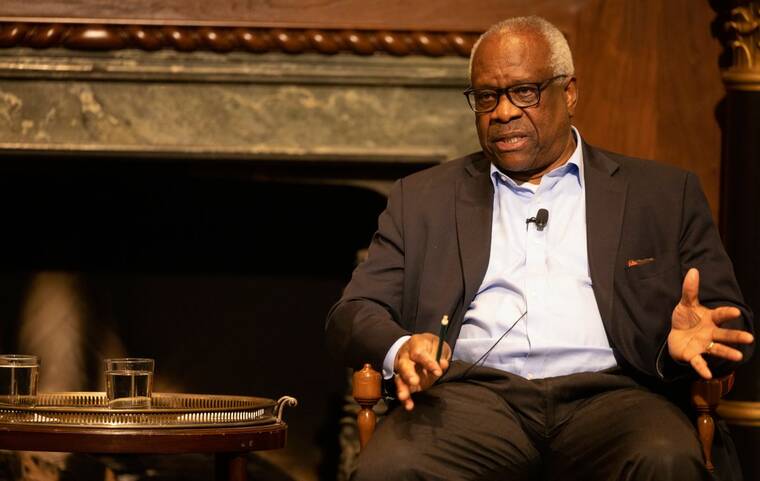Clarence Thomas acknowledges 2019 trips paid by Harlan Crow

ALLISON V. SMITH/THE NEW YORK TIMES
Supreme Court Justice Clarence Thomas at a conference in Dallas, in May 2022. Thomas acknowledged, today, instances of additional luxury travel he had accepted from a conservative billionaire, amending a previous financial disclosure to reflect trips he had taken to an Indonesian island and a secretive all-male club in the Northern California redwoods.
Justice Clarence Thomas acknowledged today additional luxury travel he had accepted from a conservative billionaire, amending a previous financial disclosure to reflect trips he had taken to an Indonesian island and a secretive all-male club in the Northern California redwoods.
The trips, taken in 2019, were earlier revealed by ProPublica, but it is the first time Thomas has included them on his financial disclosures.
Other Supreme Court justices chronicled their gifts, travel and money earned from books and teaching. Justice Ketanji Brown Jackson reported receiving four concert tickets valued at about $3,700 from Beyoncé and $10,000 of artwork for her chambers from Alabama artist and musician Lonnie Holley.
The financial disclosures, released yearly, are one of the few public records available about the justices’ lives, providing select details of their activities outside the court. A steady drumbeat of revelations about ties between some of the justices and wealthy donors has only intensified interest in the reports, particularly after disclosures that Thomas had accepted luxury travel and gifts from billionaire friends over decades.
Justice Samuel Alito was granted an extension this year, said the Administrative Office of the U.S. Courts, which offers support for the federal judiciary and handles the financial records. That is in keeping with his typical practice. According to Fix the Court, an advocacy group critical of the court’s lack of transparency, for more than a decade he has delayed filing his disclosure.
Last year, both Thomas and Alito requested and received extensions on filing their disclosure forms. Neither cited a reason in asking for a delay.
Don't miss out on what's happening!
Stay in touch with breaking news, as it happens, conveniently in your email inbox. It's FREE!
When his form was released to the public, Thomas included an unusual addendum, a statement defending his acceptance of gifts from Harlan Crow, a real estate magnate in Texas and a donor to conservative causes. He had “inadvertently omitted” information on earlier forms, the statement said, which also sought to justify his decision to fly on private jets. He stated that he had been advised to avoid commercial travel after the leak of the draft opinion overturning Roe v. Wade.
The Supreme Court, under mounting pressure and intense public scrutiny, adopted its first ethics code in November. Judges in lower federal courts have long been bound by a code, but the Supreme Court has never been subject to those requirements because of its special constitutional status.
Still the lack of enforcement mechanism or a process to handle ethics complaints drew criticism, as did the absence of any specific restrictions on gifts, travel or real estate deals.
However, the nine-page code cautioned that members of the Supreme Court should not participate in activities that “detract from the dignity” of the job, interfere with a justice’s ability to carry out official duties, “reflect adversely on the justice’s impartiality” or “lead to frequent disqualification.”
This article originally appeared in The New York Times.
© 2024 The New York Times Company



